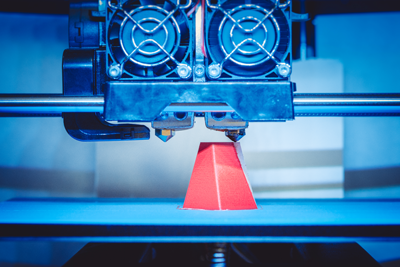 What does the future hold for the manufacturing industry? In a world where the Internet of Things, 3D printing, and an eco-friendly approach lead the way, we’re expecting huge changes to industry. From a customer driven market to the potential displacement of people in factories, we look at where manufacturing is heading and how future technologies will impact our current processes.
What does the future hold for the manufacturing industry? In a world where the Internet of Things, 3D printing, and an eco-friendly approach lead the way, we’re expecting huge changes to industry. From a customer driven market to the potential displacement of people in factories, we look at where manufacturing is heading and how future technologies will impact our current processes.
These are Innovate UK’s predictions for the future of manufacturing:
Close, Personalised Manufacturing
The end users are likely to be far closer to the source of manufacturing than they currently are now. We’re expecting it to pop up in places you wouldn’t anticipate in today’s society. From local businesses, to hospitals and even in the home. Manufacturing is set to become personalised and approachable.
An example of this would be the need for household appliance parts. You could order the part from home, get it made locally and have it delivered to your door within hours. This is even applicable to medicine. Once you order this from home, it could be custom made for your genetic make-up by your local GP or doctor surgery.
The Environmental Impact of Future Manufacturing
This personalised approach to future manufacturing is likely to give the environmental impact of the industry a boost. An emphasis will be on reducing the amount of waste product. The immediacy of manufacturing processes would remove the need to store large inventories in warehouses.
3D printing and additive manufacturing advances could help reduce waste while helping to create components which aren’t possible with modern day processes.
Popular Opinion
This future approach to manufacturing is likely to create a different impression on the public. We’re expecting people to become more interested in the information surrounding where something is made and what it’s made from.
How Will This Affect Large Factories?
Local manufacturing will likely take preference but large factories aren’t expected to fall into obscurity. We’ll still need these to generate economies of scale. The mass-production of items, especially those for international markets, could still be made in these large factories.
Large scale manufacturing processes are set to become far more efficient than what we’re used to today. We’ll see the mass emergence of companies working through a closed loop or circular economy system where waste product from one process feeds another.
Developments in this area are already being made by key manufacturers. Jaguar Land Rover’s REALCAR project (in collaboration with Innovate UK and Brunel University) is the perfect example of this next generation approach. The automotive manufacturing process now uses up to 50% recycled aluminium in new cars.
The Importance of the Internet of Things
For this idea of future manufacturing to be realised, we need complete connectivity. Every part of the process would require the ability to communicate with the next. This would help to keep track of demand. Processes will be monitored to check any downturns, potential losses or hold-ups as well as delivery times.
The Place of People
We expect there to remain a place for people in manufacturing though they’ll likely be working side-by-side with autonomous robots. Machines could look after the dangerous, repetitive or unskilled aspects of manufacturing. People, on the other hand, would work on the areas where human interaction is crucial. Design, engineering and innovation is still likely to need a human element, as will the relationship building and maintaining of customer/supplier partnerships.
The Benefits of Future Manufacturing
To summarise, we’re expecting big things from the future of manufacturing. From the ability to have items made on-demand to the potential ease of custom-made and personalised designs. We expect the ordering process to be streamlined while the locality of factories would mean a far speedier delivery time. Above all, we have high expectations for the positive environmental impacts of these future methods. What are your thoughts on the path of future manufacturing? We’d be keen to hear your views and predictions.
To find more future prediction videos like this, you can subscribe to Innovate UK’s YouTube channel here.
Additionally, follow @InnovateUK on Twitter here.

